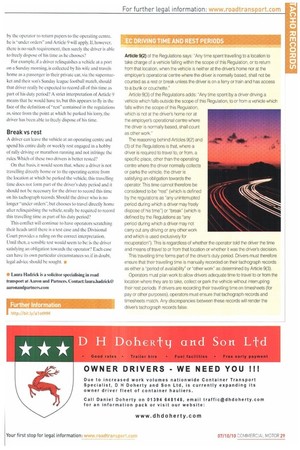Article 9(2) of the Regulations says: Any time spent travelling
Page 29

If you've noticed an error in this article please click here to report it so we can fix it.
to a location to take charge of a vehicle falling within the scope of this Regulation, or to return from that location, when the vehicle is neither at the driver's home nor at the employer's operational centre where the driver is normally based, shall not be counted as a rest or break unless the driver is on a ferry or train and has access to a bunk or couchette."
Article 9(3) of the Regulations adds: "Any time spent by a driver driving a vehicle which falls outside the scope of this Regulation, to or from a vehicle which falls within the scope of this Regulation, which is not at the driver's home nor at the employer's operational centre where the driver is normally based, shall count as other work."
The reasoning behind Articles 9(2) and (3) of the Regulations is that, where a driver is required to travel to, or from, a specific place, other than the operating centre where the driver normally collects or parks the vehicle, the driver is satisfying an obligation towards the operator. This time cannot therefore be considered to be "rest' (which is defined by the regulations as "any uninterrupted period during which a driver may freely dispose of his trne") or "break' (which is defined by the Regulations as "any period during which a driver may not carry out any driving or any other work and which is used exclusively for recuperation"), This is regardless of whether the operator told the driver the time and means of travel to or from that location or whether it was the driver's decision.
This travelling time forms part of the driver's duty period. Drivers must therefore ensure that their travelling time is manually recorded on their tachograph records as either a "period of availability" or "other work' as determined by Article 9(3).
Operators must plan work to allow drivers adequate time to travel to or from the location where they are to take, collect or park the vehicle without interrupting their rest periods. If drivers are recording their travelling time on timesheets (for pay or other purposes), operators must ensure that tachograph records and timesheets match. Any discrepancies between these records will render the driver's tachograph records false.




























































































































